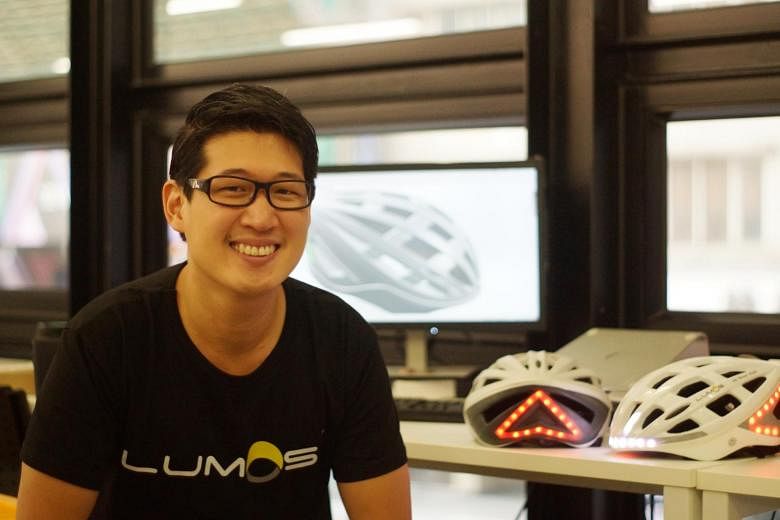Mechanical engineer Ding Eu-Wen is making a special bicycle helmet to help cyclists stay safe and visible on the roads.
The Lumos helmet, as it is called, has integrated turn signals and automatic brake lights to warn car and bus drivers of a cyclist's presence.
Mr Ding's campaign on crowdfunding site Kickstarter started on Tuesday and pulled in around US$145,000 (S$197,700) in less than a day, well over his target of US$125,000 to cover production costs. The final amount raised is expected to be higher as the campaign has 28 more days to go.
The first helmets will be delivered next April and will cost around US$85 each.
Mr Ding told The Straits Times earlier this week that the key problem for cyclists is their visibility to drivers, so "we've integrated lights into the helmets so that bikers will never forget the lights".
Giving hand signals when turning can be difficult for cyclists too as they need both hands on the handlebar when navigating potholes and road construction.
Turning signals are also part of the helmet and operate wirelessly via a remote attached to the handlebar. When a cyclist turns, he presses the left or right arrow to turn on the appropriate signal.
The Lumos helmet, which will be slightly heavier than a standard one, also has an embedded accelerometer. When a cyclist starts to stop, the brake lights automatically come on.
Mr Ding has been cycling since he was a kid, so he knows the risks on the roads. He proposed the helmet idea during a hackathon at Harvard Business School in 2013, when he was studying there. "I went to Harvard to learn how to build a company. I've always wanted to make a hardware product to improve the world and life. The hackathon showed I could do it," he said.
He dropped out of Harvard to pursue the project with co-founder Jeff Haoran Chen, also from Harvard. They invested their savings and raised some funds from family and friends to prototype the helmet.
Mr Ding, a Singaporean, is based in Hong Kong because it is easier to commute to Shenzhen, where the helmet will be made.
Before Harvard, Mr Ding worked in India on a social enterprise project called Embrace, which developed a low-cost infant warmer used to keep pre-mature babies warm without electricity. It cost US$200 compared with a commercial device costing US$20,000.


